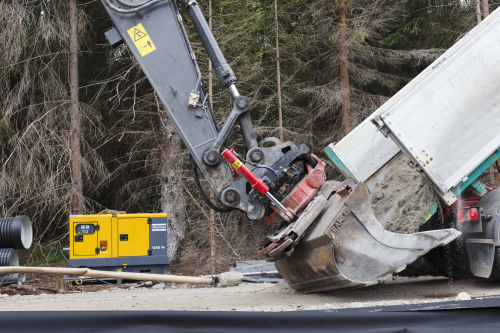
The power grid in Southern Sweden is susceptible to disruptions. To address issues such as transmission bottlenecks, the Swedish national grid operator Svenska Kraftnät has set up the SydVästlänken project. Started in 2012, the project incorporates a 270km underground cable and a 250km overhead power line. Swedish contractor Skanska handles the bulk of the underground cable laying. It has invested in Atlas Copco QAS 14 and QAS 20 on-site generators and Atlas Copco WEDA 30 and WEDA 40 submersible dewatering pumps to meet the demanding specifications of this project.
The SydVästlänken (“The South-West Link”) project aims to increase transmission capacity and robustness. The goal is to address the problems on Sweden’s west coast area when the weather is dry and consumption is low. This has resulted in incidents such as a major power outage in September 2003 that affected southern Sweden and Denmark’s Sjælland region.
SydVästlänken will tackle these issues by transferring high voltage direct current (HVDC) electricity (300kV) through a 270km underground cable and high voltage alternating current (HVAC) electricity (400kV) through a 250km overhead power line.
The project is due to be completed in 2015 and will increase transmission capacity by about 25 percent. Estimates place the cost of the works at 7.3 billion SEK. Originally the project was named to include a westbound link to Norway, but this part has since been eliminated.
“When Skanska was awarded the major part of the underground cable laying, 200km out of the total 270km, we knew that we would need suppliers that we could rely on to deliver the quality that we needed” explains Magnus Johansson, SydVästlänken Project Manager, Skanska. “The project takes us into remote areas without electricity and the requirements are demanding. After excavating almost one million cubic meters of rubble, we have to lay the cable. The base of each cable trench must be completely dry and laid with a special gravel of exacting specifications for compaction, drainage and cohesiveness.”
“To meet these specifications, we have invested in Atlas Copco QAS 14 and QAS 20 on-site generators and Atlas Copco WEDA 30 and WEDA 40 submersible dewatering pumps so far,” continues Johansson. “We are happy to report that the WEDA pumps have lived up to our expectations. As well as keeping the excavations completely dry, the pumps lower start torque and lower current requirements allow us to run more pumps on a single generator, improving productivity.”
“Atlas Copco portable equipment is made for this kind of difficult projects,” agrees Abet Cantuba, Product Marketing Manager Pumps for Atlas Copco Portable Energy. “Skanska specifically needed equipment that could run around the clock in a challenging environment, and that’s what we’ve provided.”
Atlas Copco has delivered the reliability and performance Skanska is counting on for SydVästlänken. “We have been so impressed with the Atlas Copco equipment we have on-site, that we are planning to increase our investment as the project proceeds,” concludes Johansson.





